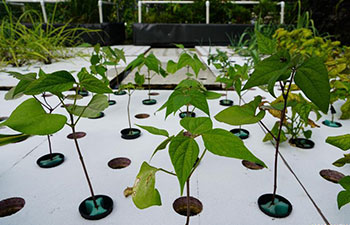SYDNEY, Aug. 24 (Xinhua) -- Scientists are concerned that chemical contaminants such as pharmaceutical by-product, may be affecting the behaviour of wildlife, with unforeseen consequences for the world's vast and delicate ecosystems.
Traces of medicines such as antidepressants that humans beings expel as waste can enter the environment and be absorbed by wildlife, affecting their behaviour, lead author of the study Minna Saaristo from Monash School of Biological Sciences told Xinhua on Friday.
The consequences of this were examined by a meta-analysis, led by scientists at Australia's Monash University, which warns that the indirect effects of contamination, such as changes in behavior and its knock on effects, are not being factored into current monitoring and study of the issue.
"Most of the research so far has only been measuring one compound using one species, and then looking at how this affects the species living alone in a lab environment, which means that when you go out in the field it is actually very far from the reality," Saaristo said.
Saaristo gives the example of a study conducted by her colleague, Tomas Brodin, into the effects of anti-anxiety drug oxazepam on Atlantic salmon, which showed that in a lab setting the effects were to make the fish "bolder."
Researchers conducting the study initially believed that this change in behavior would not be problematic and might actually benefit fish living in the wild. however when they tracked the salmon affected by the drug in their natural habitat, they found that the boldness in fact made them more likely to be eaten.
"So being bolder was actually having negative effects on their fitness," Saaristo said.
"So that just shows that what we find in the lab might be very far from reality in the field."
While it may seem unlikely that species are being contaminated with significant doses of chemicals such as anti-anxiety medication, Saaristo explained that it is actually a common consequence of human consumption.
"If you are on Prozac, and you swallow the pill, and then you urinate, it's not that all of it has been absorbed into your body," she said.
"Of course individual, everyday amounts are really small but if you think of millions of people doing this every single day then it becomes a lot, and all that is going to the wastewater treatment plant and then getting out as well."
While this current study focused particularly on contamination by pharmaceuticals, there are vast amounts of other chemicals entering the environment that have the capacity to change the behaviour of wildlife and therefore the ecosystems in which they exist.
Saaristo hoped to make relevant authorities more aware of this issue and hopefully provide them with a framework by which to understand the effects on nature's complex and interrelated ecosystems. Enditem













